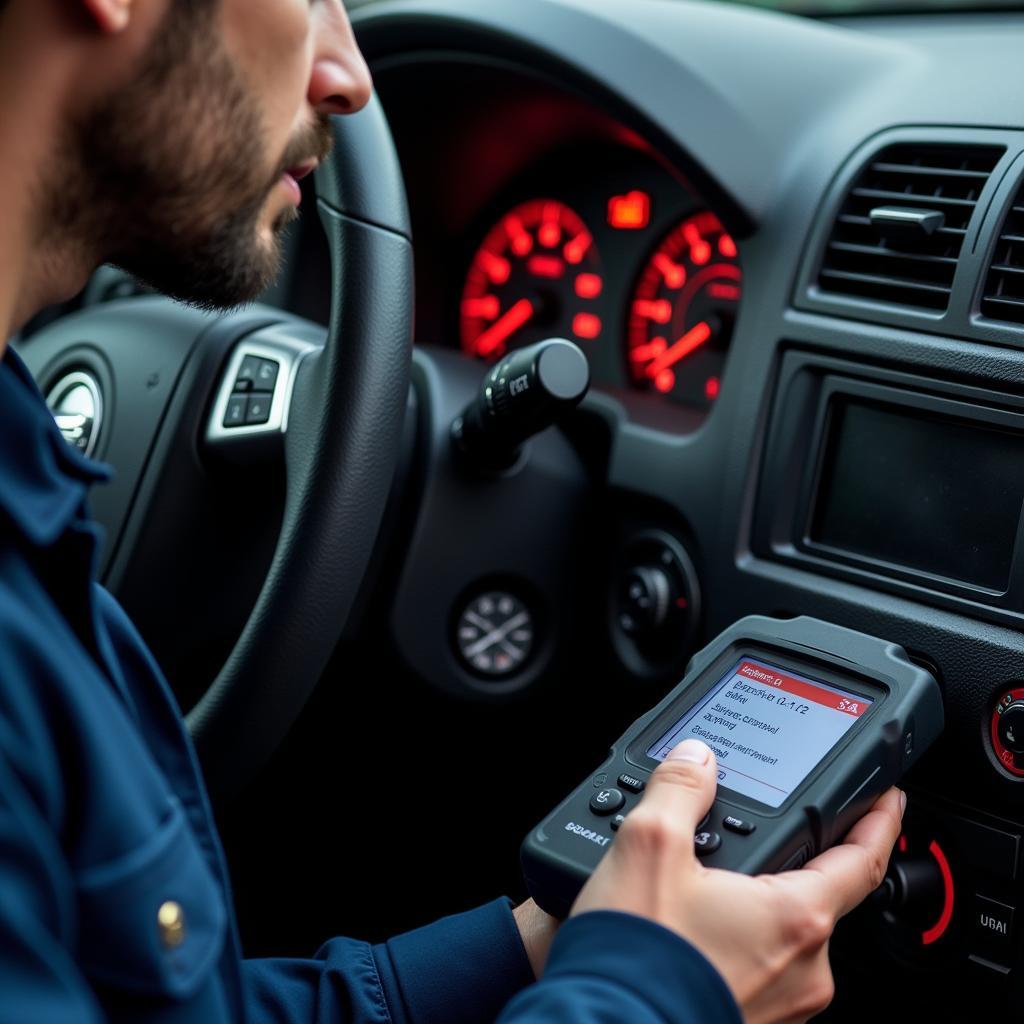Pc Diagnostics Tools are revolutionizing the automotive repair industry. These powerful tools allow mechanics to diagnose and repair car problems with greater speed and accuracy than ever before.
Gone are the days of relying solely on experience and intuition to identify car issues. With academic diagnostic tools, mechanics can access a wealth of information about a vehicle’s systems and components, identify the root cause of problems, and perform repairs with confidence.
What are PC Diagnostics Tools?
PC diagnostics tools, also known as OBD scanners or code readers, are software programs that interface with a vehicle’s onboard computer system. They use the OBD-II port, which is typically located under the dashboard, to access data from the car’s various electronic control units (ECUs).
[image-1|pc-diagnostics-tools-connected-to-car|Mechanic using PC diagnostics tools|A mechanic is shown connecting a PC diagnostics tool to the OBD-II port of a car. The laptop screen displays diagnostic information being retrieved from the vehicle’s computer system.]
This data provides insights into the performance of the engine, transmission, brakes, airbags, and numerous other systems. PC diagnostics tools can read and clear diagnostic trouble codes (DTCs), display live data streams from sensors, and perform various tests to help pinpoint the source of a problem.
Benefits of Using PC Diagnostics Tools
The use of PC diagnostics tools offers a range of benefits for both car owners and mechanics:
-
Accurate Diagnostics: PC diagnostics tools provide precise and detailed information about a vehicle’s health, enabling mechanics to identify the root cause of problems quickly. This eliminates guesswork and reduces the likelihood of unnecessary repairs.
-
Time Efficiency: By quickly pinpointing issues, PC diagnostics tools save mechanics significant diagnostic time. This translates to faster turnaround times for car repairs.
-
Cost Savings: Accurate diagnostics and efficient repairs ultimately lead to cost savings for car owners. They can avoid paying for unnecessary repairs and minimize the time their vehicle spends in the shop.
-
Advanced Functionality: Many PC diagnostics tools offer advanced features like bi-directional control, which allows mechanics to interact with vehicle systems for testing and component activation.
-
Access to Information: These tools provide access to a wealth of technical data, wiring diagrams, and repair guides, empowering mechanics with the knowledge needed to make informed decisions.
Types of PC Diagnostics Tools
There is a wide range of PC diagnostics tools available, from basic code readers to sophisticated professional-grade systems. The right tool for you depends on your needs and budget.
- Basic Code Readers: As the name suggests, these tools primarily focus on reading and clearing DTCs. They are a budget-friendly option for car owners who want to perform basic diagnostics themselves.
[image-2|different-types-pc-diagnostics-tools|Various PC diagnostics tools|An assortment of different types of PC diagnostics tools are displayed, showcasing their varying sizes, functionalities, and connection interfaces.]
-
Mid-Range Scanners: These tools offer more advanced features, such as live data streaming, freeze frame data, and some bi-directional control capabilities. They are suitable for DIY enthusiasts and small workshops.
-
Professional-Grade Scanners: These comprehensive tools offer the full range of diagnostic features, including advanced bi-directional control, programming capabilities, and access to manufacturer-specific data. They are essential for professional mechanics and dealerships.
“Having the right PC diagnostics tool can be the difference between fixing a car in minutes and spending hours trying to diagnose an intermittent problem,” says John Smith, a veteran automotive engineer with over 20 years of experience. “The technology is constantly evolving, and it’s an investment that pays for itself many times over.”
Choosing the Right PC Diagnostics Tool
When selecting a PC diagnostics tool, consider the following factors:
-
Vehicle Compatibility: Ensure the tool is compatible with the make, model, and year of your vehicle or the vehicles you typically work on.
-
Features: Determine the specific features you need, such as live data streaming, bi-directional control, or special functions.
-
Software and Updates: Check if the software is user-friendly and if the manufacturer provides regular updates to ensure compatibility with newer vehicle models.
-
Budget: PC diagnostics tools range in price, so set a budget that aligns with your needs and usage.
[image-3|mechanic-using-pc-diagnostics-tool-laptop|Mechanic diagnosing a car with PC diagnostics tools|A mechanic is shown using a laptop-based PC diagnostics tool to diagnose a problem with a car. The laptop displays detailed information about the vehicle’s engine performance.]
The Future of Automotive Repair
PC diagnostics tools are an integral part of modern automotive repair. As vehicles become increasingly complex and reliant on electronics, the role of these tools will only continue to grow. Mechanics and car owners who embrace this technology will be well-equipped to handle the challenges of repairing and maintaining today’s sophisticated vehicles.
For all your PC diagnostics tool needs and expert advice, contact ScanToolUS at +1 (641) 206-8880 or visit our office at 1615 S Laramie Ave, Cicero, IL 60804, USA.


